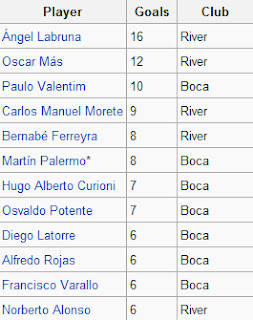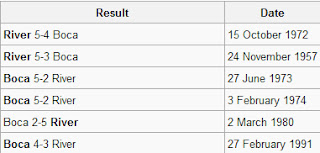The Superclasico
Superclásico is the name used to describe the football match in Argentina between Buenos Aires rivals Boca Juniors and River Plate. It derives from the Spanish usage of "clásico" to mean derby, with the prefix "super" used as the two clubs are the most popular and successful clubs in Argentine football. According to some statistics, they commandeer more than 70% of all Argentine football fans between them, with Boca claiming 40% and River 32%.
The Superclásico is known worldwide as one of the fiercest and most important derbies. In April 2004, the English newspaper The Observer put the Superclásico at the top of their list of "50 sporting things you must do before you die", saying that "Derby day in Buenos Aires makes the Old Firm game look like a primary school kick-about."
The Superclásico is known worldwide as one of the fiercest and most important derbies. In April 2004, the English newspaper The Observer put the Superclásico at the top of their list of "50 sporting things you must do before you die", saying that "Derby day in Buenos Aires makes the Old Firm game look like a primary school kick-about."
The Classic Match
Next week Boca Juniors and River Plate are going to play The Classic Match of Argentina.
Angel Cappa, the DT of River is prepearing his team, as Claudio Borghi's team is practicing.
Angel Cappa, the DT of River is prepearing his team, as Claudio Borghi's team is practicing.
AFA (Argentina Football Association)
AFA (Argentina Football Association)
The Argentine Association Football League (in English) was founded on February 21 1893 (thus it is the oldest in South America and one of the oldest to be formed outside Europe), to be later renamed Argentine Football Association in 1903, and translated into Asociación Argentina de Football (Argentine Football Association) in 1912.
The parallel Federación Argentina de Football (Argentine Football Federation), founded in 1912, joined the Asociación Argentina de Football, as well as did the 1919 founded Asociacion Amateurs de Football (Amateur Football Association) in 1926.
In 1926 it was again renamed to Asociación Amateur de Argentina de Football (Argentine Amateur Football Association), but with the professionalization of the sport in 1931 it was named Asociación de Football Amateur y Profesionales (Amateur and Professional Football Association). The first round of the first professional championship was on May 31 1931.
The Liga Argentina de Football (Argentine Football League), founded in 1931 merged with the Asociación de Football Amateur y Profesionales on November 3, 1934, into what is still today the Asociación de Fútbol Argentino (Argentine Football Association).
The Argentine Association Football League (in English) was founded on February 21 1893 (thus it is the oldest in South America and one of the oldest to be formed outside Europe), to be later renamed Argentine Football Association in 1903, and translated into Asociación Argentina de Football (Argentine Football Association) in 1912.
The parallel Federación Argentina de Football (Argentine Football Federation), founded in 1912, joined the Asociación Argentina de Football, as well as did the 1919 founded Asociacion Amateurs de Football (Amateur Football Association) in 1926.
In 1926 it was again renamed to Asociación Amateur de Argentina de Football (Argentine Amateur Football Association), but with the professionalization of the sport in 1931 it was named Asociación de Football Amateur y Profesionales (Amateur and Professional Football Association). The first round of the first professional championship was on May 31 1931.
The Liga Argentina de Football (Argentine Football League), founded in 1931 merged with the Asociación de Football Amateur y Profesionales on November 3, 1934, into what is still today the Asociación de Fútbol Argentino (Argentine Football Association).
Futsal
Futsal is a variant of association football that is played on a smaller playing surface and mainly played indoors. Its name is derived from the Portuguese "futebol de salão" and the Spanish "fútbol de salón" (colloquially fútbol sala), which can be translated as "hall football" or "indoor football". During the sport's second world championships held in Madrid in 1985, the name fútbol de salón was used. Since then, all other names have been officially and internationally changed to futsal.
Futsal is played between two teams of five players each, one of them is the goalkeeper .Only five players (including the goalkeeper) are allowed on the field). Unlimited substitutes per team are permitted. Unlike some other forms of indoor football, the game is played on a hard court surface delimited by lines; walls or boards are not used. Futsal is also played with a smaller ball with less bounce than a regular football. The rules create an emphasis on improvisation, creativity and technique as well as ball control and passing in small spaces.
Suscribirse a:
Comentarios (Atom)









